人教版高中英语必修一 模块一.docx
人教版高中英语必修一Unit 1课文精讲
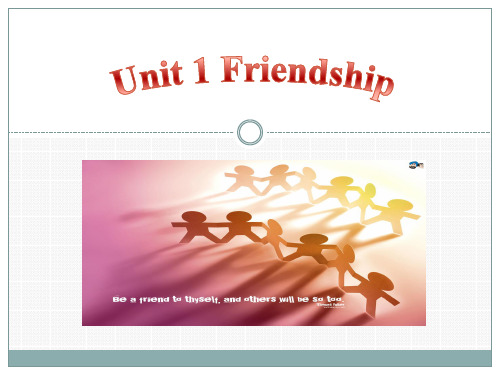
be able to do sth.相当于 can,有能力 做某事;能 做某事
v.种植;生长,发育;渐 渐变得,变成 grow to do…渐渐形成某 种态度 grow up长大,成年
我不知道这是不是因为我太久无法出门的缘故,我 变得对一切与大自然有关的事物都无比狂热。
极其;非常; 远远
看一看;看一眼
n.挑战;挑动 v.敢;胆敢
比如说,有一天晚上天气很暖和,我故意熬到晚上11点半都 亮了,我都不敢打开窗户。
发生于;偶然发生
adv.在楼上; 上楼; adj.楼上的 n.楼上
Another time five months age, I happened to be upstairs at dusk when the window was open. I didn’t go downstairs until the window had to be shut.
嘲笑; 因„而发笑 参加;经受; 仔细检查;被通过
你想不想有一位无话不谈能推心置腹的朋友?或者你 会不会担心你的朋友会嘲笑你,会不理解你目前的困 境呢?安妮·弗兰克想要的是第一种类型的朋友,所 以她把的日记视为自己最好的朋友。
catch:v.赶上;抓住 n.捕捉;捕获物 be+V过去分词,表示被动
保持清醒;保持醒着的 为了„„
For example, one evening when it was so warm, I stayed awake on purpose until half past eleven in order to have a good look at the moon by myself. But as the moon gave far too much light, I didn’t dare open a window.
人教版高中英语必修一Unit 1 Friendship.docx

高中英语学习材料***鼎尚图文理制作***Unit 1 FriendshipLearning about Language & Using Language课时作业Ⅰ.单词拼写1.I have packed (打包) up my clothes;I'm ready to go on a holiday.2.I am not good at communicating (与……沟通) with other people.3.He suffered (患有)from a serious heart attack before, but now he is all right.4.Can you tell me the exact (确切的) date of your coming here?5.I was grateful (感激的) to my English teacher in the junior school who gave me so much help.6.He fully recovers (痊愈) himself after the operation.7.Nowadays many teenagers (青少年) are crazy about rock music.8.I quite disagree (不同意) with what you said just now.Ⅱ.阅读理解AOne of the most important things in the world is friendship.In order to have friends,you have to be a friend.But how can you be a good friend at school?Listen—Listen when they are talking.Don’t say anything unless they ask you a question.Sometimes it’s not necessary for you to have anything to say;they just need someone to talk to about their feelings.Help them—If your friend is ever in need of something,be there to help them.You should try to put them first,but make sure you don’t do everything they want you to do.Try to take an extra (额外的) pencil or pen with you to classes in case (以防) they forget one.Have a little extra money in your pocket in case they forget something they need.Be there for them—Try to make something for your friend to help make them feel better in hard times.Making cards and encouraging them are among the nicest things you can do for a friend.Marilyn Monroe,a famous US actor,once said,“I often make mistakes.Sometimes I am out of control.But if you can’t stay with me at my worst,you are sure not to deserve (值得) to be with me at my best.” Always remember this!If you don’t want to stay with your friends when they’re in hard times,then you don’t deserve to be with them when they’re having a good time!________—Try to make plans with your friends.Go shopping,go for ice cream,have a party,go to a movie and so on.Take time to know each other even better by doing something youboth enjoy.By planning things together,you both can have a good time.And you’ll remember these things when you’re all old!语篇解读本文是一篇说明文,主要说明在学校我们应该如何做才能成为别人的好朋友。
人教版高中英语必修一高一Module1第一节

Reviewtheexpressionswelearnedinthisclass.
PreviewReading&vocabulary
LOGO
新课单词
Zxxk
biology
chemistry
English
geography
history
Chinese
Zxxk
mathematics
physics
WhatsubjectsdidyoulearnatyourJunior High?
Chinese Mathematics
I.T.
English
Whenyoutalkaboutyourlikesordislikes,youca nusethefollowingexpressions:
Ilike/don’tlike/hate…because…. Ithink…isimportant/difficult/…because…. Idon’tthink…isimportant/difficult/…because….
Pairwork
Workinpairsandmakeintroducti onaboutyourselfeachother.
ModuleOne
MyFirstDayatSeniorHigh Zxxk Period1
Lookandanswer Workinpairs.Talkaboutthefollowingques tionswithyourpartners. 1.Bringoutasmanywordsaboutthe subjectsaspossible 2.Whichofthesubjectsdoyoustudyat school? 3.Whichareyourfavouritesubjects? 4.Whichareyourdifficultsubjects? 5.Whichdoyouthinkareimportant?
人教版高中英语必修一Module1.docx

高中英语学习材料***鼎尚图文理制作***Module 1 Wonders of the world笔试部分一、选择填空(本题共15分,每小题1分)在各题所给的三个选项中,选出一个最佳选项。
( ) 1. She ______________ the Grand Canyon twice.A. has been toB. has gone toC. went to( ) 2. They will have a trip to the Great Wall if it tomorrow.A. won’t rainB. doesn’t rainC. not rain( )3.-Is Susan going to her hometown by train?-I guess she ________ . I know she likes driving her new car.A. mustn’tB. can’tC. may not( ) 4. We had a party last month, and it was so fun. Why don’t we have _______ one this month?A. moreB. anotherC. the other( ) 5. “Please don’t be angry with me,” said Amy laughingly. This made me even _________.A. angryB. angrierC. angriest( ) 6. Don’t make any noise, Grandma (sleep).A. sleepsB. sleptC. is sleeping( )7.-I won’t go to Ann’s birthday party this coming Saturday.-___________ you told me you would. What’s happening?A. ButB. SoC. And( ) 8. His wife got hurt in the accident. I didn’t know how to tell him _____ bad news.A. aB. theC. /( ) 9. Tina can’t see the blackboard because the boy who sits _________ her is verybig and tall.A. behindB. in front ofC. next to( ) 10. There (be) a meeting next Monday.A. isB. willC. will be( ) 11. As soon as he comes back, I’ll tell him when _____________ and see him.A. you will comeB. will you comeC. you come( ) 12. – Haven’t I told you I like coffee without sugar? -Sorry, but I only __________ a little.A. am puttingB. putC. will put( )13. -Excuse me, may I use your dictionary?-Sorry, I have no dictionary.-_______________ .A. That’s rightB. Thank you all the sameC. You can buy one ( ) 14. She in this factory for ten years...A. worksB. workedC. has worked( ) 15. There are so many kinds of MP4 players in the shop. I can’t decide ________.A. what to buyB. which to buyC. when to buy二、完形填空(本题共10分,每小题1分)通读下面短文,掌握其大意,然后在各题所给的三个选项中,选出一个最佳选项。
人教版高中英语必修一高一英语上学期模块考试试题.docx

人教版高中英语必修一高一英语上学期模块考试试题广东实验中学2013—2014学年高一级模块一考试英语命题: 汪波审题: 左月娟本试卷分选择题和非选择题两部分,共9页,满分150分,考试用时120分钟。
注意事项:1.答卷前,考生务必用黑色字迹的钢笔或签字笔将自己的姓名、考号填写在答题卡上。
2.选择题每小题选出答案后,用2B铅笔把答题卡上对应题目的答案标号涂黑;如需改动,用橡皮擦干净后,再选涂其它答案;不能答在试卷上。
3.非选择题必须用黑色字迹的钢笔或签字笔作答,答案必须写在另发的答题卷各题目指定区域内的相应位置上;如需改动,先划掉原来的答案,然后再写上新的答案;不准使用铅笔和涂改液.不按以上要求作答的答案无效。
4.考生必须保持答题卡的整洁,考试结束后,将答题卷和答题卡一并收回。
I 听力(共两节,满分20分)第一节听力理解 (3段共9小题;每小题1分,满分9分)每段播放两遍,各段后有几个小题,各段播放前,每小题有5秒钟的阅题时间,请根据各段播放内容及相关小题,在5秒钟内,从题中所给的A、B、C项中选出最佳选项并在答题卡上将该项涂黑。
听第一段对话,回答第1~3题。
1. Which of the following is true about the man?A. He never drinks wine.B. He dislikes hot food.C. He doesn't eat seafood.2. What dish does the man choose?A. Fish.B. Pork.C. Beef.3. Where will the man go after he has finished eating?A. Back to his work.B. For a rest.C. To his home.听第二段对话,回答第4—6题。
4. What do we know about the speakers?A. They live in London.B. It is their first time in England.C. They studyin Scotland.5. How can the speakers get to the Tower ofLondon from where they are?A. Go straight, turn right then walk ahead.B. Walk along the river then turn left.C. Walk to the river, turn left then go straight.6. How will the speakers tour around the city?A. On foot.B. By bicycle.C. By bus.听第三段独白,回答第7-9题。
人教版高中英语必修一1高一英语单元M112
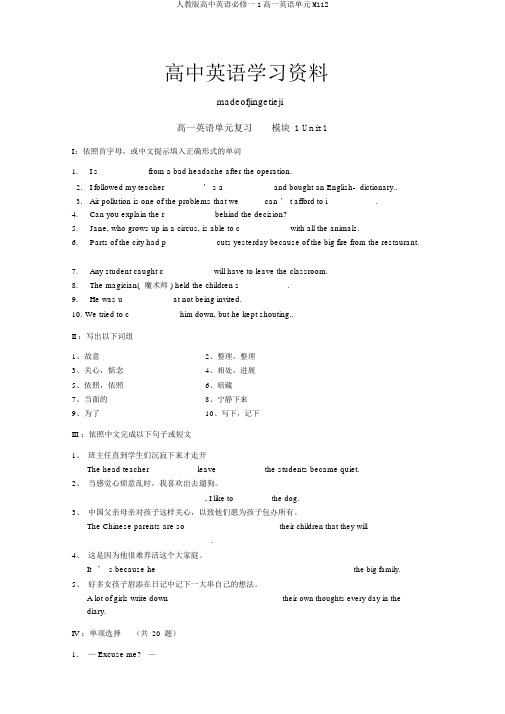
高中英语学习资料madeofjingetieji高一英语单元复习模块 1 Unit 1I:依照首字母,或中文提示填入正确形式的单词1.I s___________ from a bad headache after the operation.2.I followed my teacher’ s a___________ and bought an English-dictionary..3.Air pollution is one of the problems that we can ’ t afford to i___________.4.Can you explain the r___________ behind the decision?5.Jane, who grows up in a circus, is able to c___________ with all the animals.6.Parts of the city had p___________ cuts yesterday because of the big fire from the restaurant.7.Any student caught c___________ will have to leave the classroom.8.The magician( 魔术师 ) held the children s___________.9.He was u___________ at not being invited.10.We tried to c___________ him down, but he kept shouting..II:写出以下词组1、故意2、整理,整理3、关心,惦念4、相处,进展5、依照,依照6、暗藏7、当面的8、宁静下来9、为了10、写下,记下III:依照中文完成以下句子或短文1、班主任直到学生们沉寂下来才走开The head teacher __________ leave __________ the students became quiet.2、当感觉心烦意乱时,我喜欢出去遛狗。
(word完整版)人教版高中英语必修一Unit1教案.doc
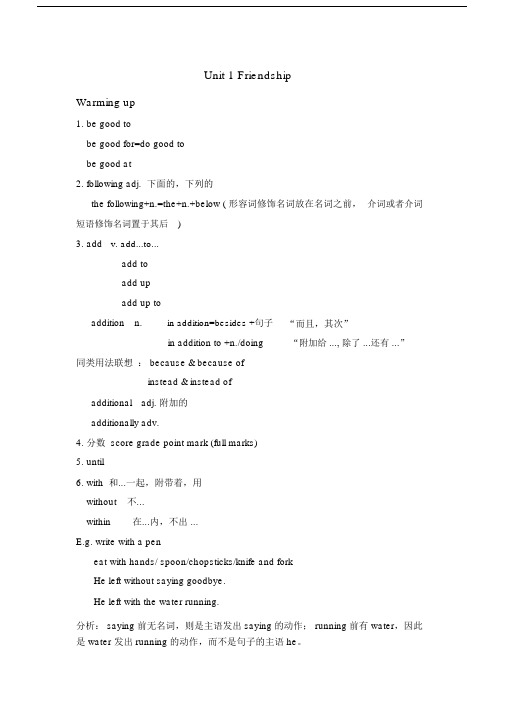
Unit 1 FriendshipWarming up1.be good tobe good for=do good tobe good at2.following adj. 下面的,下列的the following+n.=the+n.+below ( 形容词修饰名词放在名词之前,介词或者介词短语修饰名词置于其后)3. add v. add...to...add toadd upadd up toaddition n.in addition=besides +句子in addition to +n./doing 同类用法联想: because & because ofinstead & instead of “而且,其次”“附加给 ..., 除了 ...还有 ...”additional adj. 附加的additionally adv.4. 分数 score grade point mark (full marks)5. until6. with 和...一起,附带着,用without 不...within在...内,不出 ...E.g. write with a peneat with hands/ spoon/chopsticks/knife and forkHe left without saying goodbye.He left with the water running.分析: saying 前无名词,则是主语发出 saying 的动作; running 前有 water,因此是 water 发出 running 的动作,而不是句子的主语 he。
翻译练习:(1)他今天去上班没带领带。
Today, he went to work without (wearing) his tie.(2)他在没有其他人帮助的情况下自己完成了作业。
7.pay for payto do sth8. get sb to do sth(make/have/let sb do sth)get sb/sth doneget done get lost/prepared/dressed/involved9.形容词做状语,表示句子主语的特征、属性和状态副词做状语,表示谓语动词的完成方式E.g. He returned home last night, sad and disappointed.He left hurriedly.10. concern n. 担心,忧虑concern about/for/over...E.g. She hasn’ t been seen for four days and there is concern for her safety.That is a big concern.v. 涉及,与 ...有关be concerned withconcerning E.g. He asked several questions concerning the future of the company.翻译练习:不要问女人们涉及她们年龄的问题。
人教版高一英语必修一unit1知识点
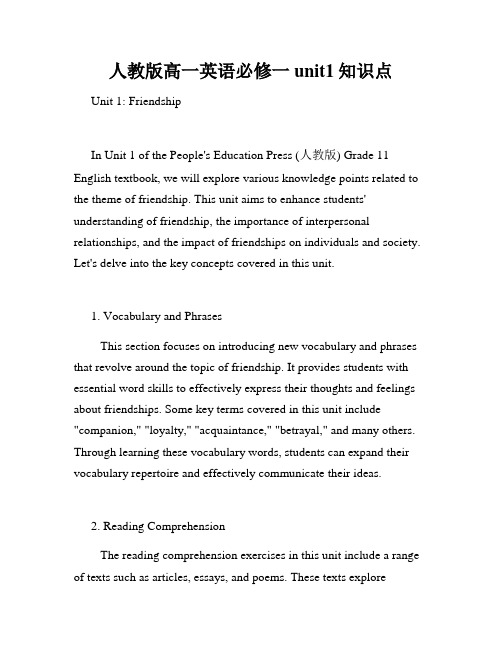
人教版高一英语必修一unit1知识点Unit 1: FriendshipIn Unit 1 of the People's Education Press (人教版) Grade 11 English textbook, we will explore various knowledge points related to the theme of friendship. This unit aims to enhance students' understanding of friendship, the importance of interpersonal relationships, and the impact of friendships on individuals and society. Let's delve into the key concepts covered in this unit.1. Vocabulary and PhrasesThis section focuses on introducing new vocabulary and phrases that revolve around the topic of friendship. It provides students with essential word skills to effectively express their thoughts and feelings about friendships. Some key terms covered in this unit include "companion," "loyalty," "acquaintance," "betrayal," and many others. Through learning these vocabulary words, students can expand their vocabulary repertoire and effectively communicate their ideas.2. Reading ComprehensionThe reading comprehension exercises in this unit include a range of texts such as articles, essays, and poems. These texts exploredifferent aspects of friendship, including its definition, qualities, and challenges. By analyzing and reflecting on these texts, students can gain insights into the nature of friendship and its significance in their own lives.3. GrammarThe grammar section of this unit provides an opportunity for students to consolidate their understanding of essential grammar rules and structures in English. This unit covers topics such as subject-verb agreement, verb tenses, reported speech, conditionals, and relative clauses. By mastering these grammar rules, students can improve their overall language accuracy and fluency.4. Speaking and ListeningThe speaking and listening activities in this unit encourage students to engage in meaningful conversations about friendships. Through paired or group discussions, students can share their thoughts, opinions, and personal experiences related to friendship. This helps develop their communication skills, active listening abilities, and mutual respect for diverse perspectives.5. Writing SkillsThis section focuses on enhancing students' writing skills by providing them with various writing tasks related to friendship. Students are encouraged to write personal narratives, essays, letters, or poems reflecting their understanding of friendship and its impact on their lives. By expressing their thoughts through writing, students can effectively communicate their emotions and ideas while developing their creativity and critical thinking skills.6. Culture CornerThe Culture Corner segment in this unit provides students with insights into friendship customs and traditions in different cultures. By exploring and comparing friendship practices in various cultures, students can develop a global perspective and appreciate the diversity of human relationships.In conclusion, Unit 1 of the People's Education Press Grade 11 English textbook offers a comprehensive exploration of friendship. Through vocabulary building, reading comprehension, grammar practice, speaking and listening activities, writing exercises, and cultural insights, students can deepen their understanding of the significance of friendship in their lives and society as a whole.。
高中英语人教版浙江专版必修1Unit 1 Section 1 Word版含答案
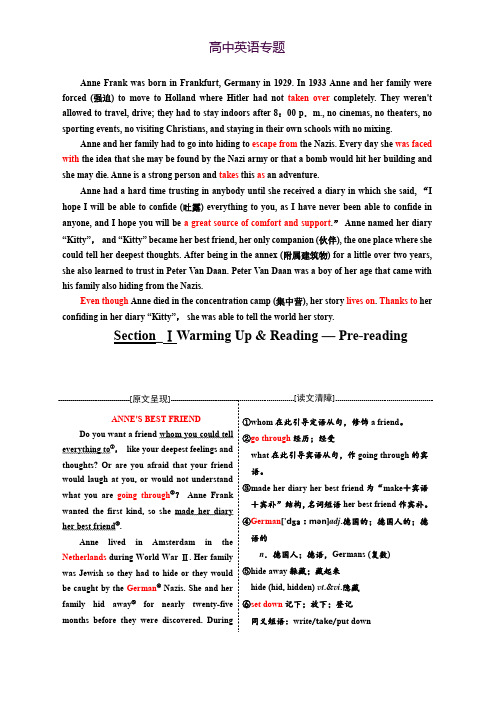
Anne Frank was born in Frankfurt, Germany in 1929. In 1933 Anne and her family were forced (强迫) to move to Holland where Hitler had not taken over completely. They weren't allowed to travel, drive; they had to stay indoors after 8:00 p.m., no cinemas, no theaters, no sporting events, no visiting Christians, and staying in their own schools with no mixing.Anne and her family had to go into hiding to escape from the Nazis. Every day she was faced with the idea that she may be found by the Nazi army or that a bomb would hit her building and she may die. Anne is a strong person and takes this as an adventure.Anne had a hard time trusting in anybody until she received a diary in which she said, “I hope I will be able to confide (吐露) everything to you, as I have never been able to confide in anyone, and I hope you will be a great source of comfort and support.” Anne named her diary “Kitty”, and “Kitty” became her best friend, her only companion (伙伴), the one place where she could tell her deepest thoughts. After being in the annex (附属建筑物) for a little over two years, she also learned to trust in Peter Van Daan. Peter Van Daan was a boy of her age that came with his family also hiding from the Nazis.Even though Anne died in the concentration camp (集中营), her story lives on. Thanks to her confiding in her diary “Kitty”, she was able to tell the world her story.Section_ⅠWarming Up & Reading — Pre-readingANNE'S BEST FRIENDDo you want a friend whom you could tell everything to①,like your deepest feelings and thoughts? Or are you afraid that your friend would laugh at you, or would not understand what you are going through②?Anne Frank wanted the first kind, so she made her diary her best friend③.Anne lived in Amsterdam in the Netherlands during World War Ⅱ. Her family was Jewish so they had to hide or they would be caught by the German④ Nazis. She and her family hid away⑤for nearly twenty-five months before they were discovered. During ①whom在此引导定语从句,修饰a friend。
人教版高中英语必修一第一学期高一年级.docx
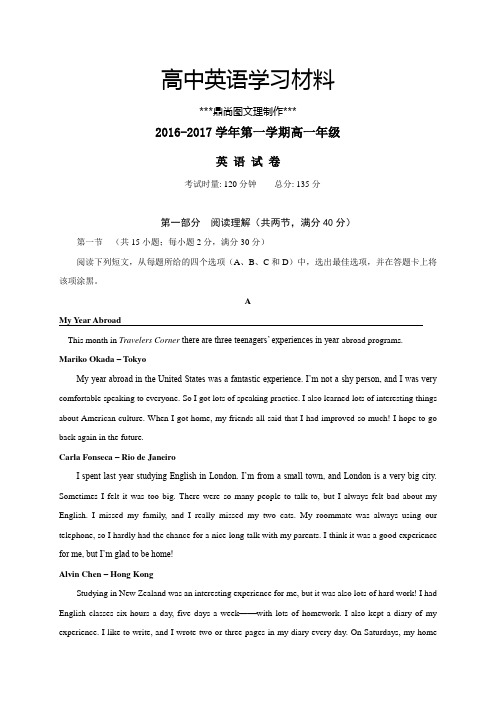
高中英语学习材料***鼎尚图文理制作***2016-2017学年第一学期高一年级英语试卷考试时量: 120分钟总分: 135分第一部分阅读理解(共两节,满分40分)第一节(共15小题;每小题2分,满分30分)阅读下列短文,从每题所给的四个选项(A、B、C和D)中,选出最佳选项,并在答题卡上将该项涂黑。
AMy Year AbroadThis month in Travelers Corner there are three teenagers’ experiences in year-abroad programs.Mariko Okada – TokyoMy year abroad in the United States was a fantastic experience. I’m not a shy person, and I was very comfortable speaking to everyone. So I got lots of speaking practice. I also learned lots of interesting things about American culture. When I got home, my friends all said that I had improved so much! I hope to go back again in the future.Carla Fonseca – Rio de JaneiroI spent last year studying English in London. I’m from a small town, and London is a very big city. Sometimes I felt it was too big. There were so many people to talk to, but I always felt bad about my English. I missed my family, and I really missed my two cats. My roommate was always using our telephone, so I hardly had the chance for a nice long talk with my parents. I think it was a good experience for me, but I’m glad to be home!Alvin Chen – Hong KongStudying in New Zealand was an interesting experience for me, but it was also lots of hard work! I had English classes six hours a day, five days a week——with lots of homework. I also kept a diary of my experience. I like to write, and I wrote two or three pages in my diary every day. On Saturdays, my homestay family took me to lots of interesting places and showed me so many wonderful things about the culture. I’m really glad I went!1. All the three teenagers went abroad .A. to study EnglishB. to visit friendsC. to have a holidayD. to find a job2. Who didn’t really enjoy the stay in a foreign country very much?A. Mariko.B. Carla.C. Alvin.D. None of them.3. Travelers Corner is most probably .A. a sports club newsletterB. a science documentaryC. a travel magazineD. a news websiteBMr Brown was going away for a week. Before he left, he said to his son, "if anyone asks for me, you can tell him that your father has been out for doing something, and will be back in a week, then be sure to ask him to sit down for a cup of tea.""OK, Dad," said his son. But he was afraid his son couldn't remember this, he wrote these words down on a piece of paper and gave it to him. His son put it into his small pocket, took it out and looked at it every now and then.Four days passed, but no one came to see his father. The boy thought that there was no man to come and that the piece of paper was of no more use for him, so he burnt it that evening.The next afternoon, someone knocked at the door. The boy opened it. A man was standing at the door and said, "Where is your father?" The boy put his hand into his pocket at once and looked for the piece of paper. He could not find it. He suddenly remembered he had burnt it, so he shouted, "No more."The man was very surprised. He asked, "No more? I met your father last week. When did it happen?""Burnt yesterday evening."4. Mr Brown told his son that _____.A. he would be away from home for four daysB. he would be back in seven daysC. he would be back in a monthD. he liked a cup of tea5. Mr Brown wrote the words down on ________.A. the wallB. the doorC. a piece of paperD. his son's pocket6. A man came to visit the boy's father on ________.A. the second dayB. the third dayC. the fourth dayD. the fifth day7. The man was very surprised because _________.A. he thought the child's father was deadB. the child didn't ask him to sit downC. the child gave him a cup of teaD. he couldn't find that piece of paperCI work in a nursing home and my job is to take care of the elderly. This year, a very sweet old lady that I cared for, Alice, had gone through a difficult time. She got dementia and so she had been in the hospital twice. In November I was finally able to get her back to her “home”.Alice had thought her daughter was coming to visit her on Christmas day and that they were going to have the whole family together like the old days. When she finally realized that the happy moment was not going to happen, she was very sad. Knowing that her daughter was coming after Christmas was not enough to make her feel happy, I hated the idea of her being alone on the holiday!On Christmas Eve, I gave her a surprise by asking if she would like to go to a candlelight service(礼拜) at church that night. Instead of taking her to my church, I took her to her old neighborhood church where all her friends were. We got there early and I got her a seat where her friends could see her as they came in. Then soon some of her friends came to the church and they rushed over to greet her and sit with her.The candlelight service was beautiful and Alice got a lot of love from her old and new friends there. The truth of the story is that I am the one who got the best gift: the smile on Alice's face.8. The underlined word “dementia” in Paragraph 2 probably is _____.A. an illnessB. a letterC. a houseD. a plan9. Where did Alice spend her Christmas Eve according to the story?A. In her old house.B. In her old neighborhood church.C. In the nursing home.D. In the hospital.10. What was the best gift that the author got on Christmas Eve?A. Alice's happiness.B. Praise from Alice's friends.C. Thanks from Alice's daughter.D. The candlelight service.11. What is the best title for this passage?A. A special candlelight Christmas EveB. The dream of an old lonely ladyC. A real presentD. The true loveDIt may help you to know that there is no such thing as a perfect speech. At some point in every speech, every speaker says something that is not understood exactly as he has planned. Fortunately, the moments are usually not obvious to the listeners. Why? Because the listeners do not know what the speaker plans to say. They hear only what the speaker does say. If you lose your place for moment, wrongly change the order of a couple of sentences, or forget to pause at a certain point, no one will be any the wiser. When such moments occur, don't worry about them. Just continue as if nothing happened.Even if you do make an obvious mistake during a speech, that doesn't really matter. If you have ever listened to Martin Luther King's famous speech—“I have a dream”, you may notice that he stumbles(结巴)his words twice during the speech. Most likely, however, you don't remember. Why? Because you were fixing your attention on his message rather than on his way of speech-making. People care a lot about making mistake in a speech because they regard speech-making as a kind of performance rather than as an act of communication. They feel the listeners are like judges in an ice-skating competition. But, in fact, the listeners are not looking for a perfect performance. They are looking for a well-thought-out speech that expresses the speaker's ideas clearly and directly. Sometimes a mistake or two can actually increase a speaker's attractiveness by making him more human.As you work on your speech, don't worry about being perfect. Once you free your mind of this, you will find it much easier to give your speech freely.12. You don't remember obvious mistakes in a speech because _________.A. your attention is on the contentB. you don't fully understand the speechC. you don't know what the speaker plans to sayD. you find the way of speech-making more important13. People always worry about making mistakes in a speech because _________.A. they consider speech-making as an act of communicationB. they think speech-making is a kind of performanceC. they regard speech-making as a kind of performance as well as an act of communicationD. they want to be perfect14. It can be inferred from the passage that ________.A. giving a speech is like giving a performanceB. one or two mistakes in a speech may not be badC. the listeners should pay more attention to how speech is madeD. the more mistakes a speaker makes, the more attractive he will be15. What would be the best title for the passage?A. How to Be a Perfect SpeakerB. How to Make a Perfect SpeechC. Don't Expect a Perfect SpeechD. Don't Expect Mistakes in a Speech第二节(共5小题;每小题2分,满分10分)根据短文内容,从短文后的选项中选出能填入空白处的最佳选项,并在答题卡上将该项涂黑。
人教版高中英语必修一UNIT1 Workbook

2 Listen to the story to find out what happened. (P43)
What Anne’s What Anne
father thought thought
about being friends with Peter
She should be She wanted
Listening text
One Saturday evening I talked to Daddy about my friendship with Peter. Daddy said, “I think you must be careful, Anne. We live very close together here.” Then On Sunday morning he called me and we talked about it again. He said, “Anne, I have thought about what you told me.
careful to
her father to
make friends be happy for
with Peter. her to have a
friend.
about talking He was to him every unhappy. night
She wanted to continue.
2) They take her to visit a beautiful lake in the countryside F
3) Most people invite her to their home as guests. F
Listening Text
(完整版)高中英语人教版必修一全册课文内容电子版.docx
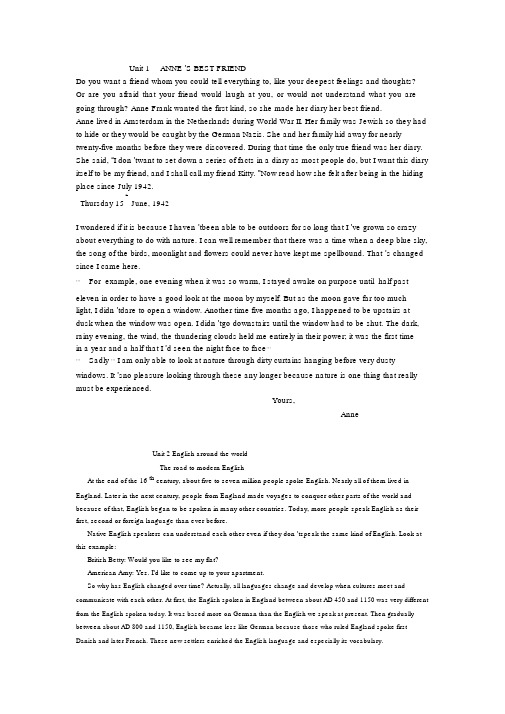
Unit 1 ANNE ’S BEST FRIENDDo you want a friend whom you could tell everything to, like your deepest feelings and thoughts?Or are you afraid that your friend would laugh at you, or would not understand what you are going through? Anne Frank wanted the first kind, so she made her diary her best friend.Anne lived in Amsterdam in the Netherlands during World War II. Her family was Jewish so they had to hide or they would be caught by the German Nazis. She and her family hid away for nearly twenty-five months before they were discovered. During that time the only true friend was her diary. She said, “I don ’twant to set down a series of facts in a diary as most people do, but I want this diary itself to be my friend, and I shall call my friend Kitty. ”Now read how she felt after being in the hiding place since July 1942.thThursday 15June, 1942I wondered if it is because I haven ’tbeen able to be outdoors for so long that I ’ve grown so crazy about everything to do with nature. I can well remember that there was a time when a deep blue sky, the song of the birds, moonlight and flowers could never have kept me spellbound. That ’s changed since I came here.⋯For example, one evening when it was so warm, I stayed awake on purpose until half pasteleven in order to have a good look at the moon by myself. But as the moon gave far too much light, I didn ’tdare to open a window. Another time five months ago, I happened to be upstairs at dusk when the window was open. I didn ’tgo downstairs until the window had to be shut. The dark, rainy evening, the wind, the thundering clouds held me entirely in their power; it was the first timein a year and a half that I ’d seen the night face to face⋯⋯Sadly ⋯ I am only able to look at nature through dirty curtains hanging before very dustywindows. It ’sno pleasure looking through these any longer because nature is one thing that really must be experienced.Yours,AnneUnit 2 English around the worldThe road to modern EnglishAt the end of the 16 th century, about five to seven million people spoke English. Nearly all of them lived in England. Later in the next century, people from England made voyages to conquer other parts of the world and because of that, English began to be spoken in many other countries. Today, more people speak English as their first, second or foreign language than ever before.Native English speakers can understand each other even if they don ’tspeak the same kind of English. Look at this example:British Betty: Would you like to see my flat?American Amy: Yes. I’d like to come up to your apartment.So why has English changed over time? Actually, all languages change and develop when cultures meet andcommunicate with each other. At first, the English spoken in England between about AD 450 and 1150 was very differentfrom the English spoken today. It was based more on German than the English we speak at present. Then graduallybetween about AD 800 and 1150, English became less like German because those who ruled England spoke firstDanish and later French. These new settlers enriched the English language and especially its vocabulary.So by the 1600 ’s Shakespeare was able to make use of a wider vocabulary than ever before. In 1620 some British settlers moved to America. Later in the 18 th century some British people were taken to Australia too. English began to be spoken in both countries.Finally by the 19 th century the language was settled. At that time two big changes in English spelling happened: first Samuel Johnson wrote his dictionary and later Noah Webster wrote The America Dictionary of the English Language. The latter gave a separate identity to American English spelling.English now is also spoken as a foreign or second language in South Asia. For example, India has a very large number of fluent English speakers because Britain ruled India from 1765 to 1947. During that time English became the language for government and education. English is also spoken in Singapore and Malaysia and countries in Africa such as South Africa. Today the number of people learning English in China is increasing rapidly. In fact, China may have the largest number of English learners. Will Chinese English develop its own identity? Only time will tell.STANDARD ENGLISH AND DIALECTSWhat is standard English? Is it spoken in Britain, the US, Canada, Australia, India and New Zealand? Believeit or not, there is no such thing as standard English. This is because in the early days of radio, those who reported the news were expected to speak excellent English. However, on TV and the radio you will hear differences in the way people speak.When people use words and expressions different from “standard language”, it is called a dialect. American English has many dialects, especially the midwestern, southern, African American and Spanish dialects. Even in some parts of the USA, two people from neighboring towns speak a little differently. American English has so many dialects because people have come from all over the world.Geography also plays a part in making dialects. Some people who live in the mountains of the eastern USAspeak with an older kind of English dialect. When Americans moved from one place to another, they took theirdialects with them. So people from the mountains in the southeastern USA speak with almost the same dialect as people in the northwestern USA. The USA is a large country in which many different dialects are spoken.Although many Americans move a lot, they still recognize and understand each other ’s dialects.Unit 3 JOURNEY DOWN THE MEKONGPART I THE DREAM AND THE PLANMy name is Wang Kun. Ever since middle school, my sister Wang Wei and I have dreamed about taking a great bike trip. Two years ago she bought an expensive mountain bike and then she persuaded me to buy one. Last year, she visited our cousins, Dao Wei and Y u Hang at their college in Kunming. They are Dai and grew up in western Yunnan Province near the Lancang River, the Chinese part of the river that is called the Mekong River in other countries. Wang Wei soon got them interested in cycling too. After graduating from college, we finally gotthe chance to take a bike trip. I asked my sister, “Where are we going? ”It was my sister who first had the idea to cycle along the entire Mekong River from where it begins to where it ends. Now she is planning our schedule forthe trip.I am fond of my sister but she has one serious shortcoming. She can be really stubborn. Although she didn ’t know the best way of getting to places, she insisted that she organize the trip properly. Now I know that the proper way is always her way. I kept asking her, “When are we leaving and when are we coming back?”I asked her whether she had looked at a map yet. Of course she hadn ’t; my sister doesn ’tcare about details. So I told her that the source of the Mekong is in Qinghai Province. She gave me a determined look--the kind that said she would not change her mind. When I told her that our journey would begin at an altitude of more than 5,000 metres, she said itwould be an interesting experience. I know my sister well. Once she has made up her mind, nothing can change it. Finally, I had to give in.Several months before our trip, Wang Wei and I went to the library. We found a large atlas with good maps that showed details of world geography. From the atlas we could see that the Mekong River begins in a glacier on a mountain in Qinghai Province. At first the river is small and the water is clear and cold. Then it begins to move quickly. It becomes rapids as it passes through deep valleys, travelling across western Yunnan Province. Sometimes the river becomes a waterfall and enters wide valleys. We were both surprised to learn that half of the river is in China. After it leaves China and high altitude, the Mekong becomes wide, brown and warm. As it enters Southeast Asia, its pace slows. It makes wide bends or meanders through low valleys to the plains where rice grows. At last, the river delta enters the South China Sea.PART II A NIGHT IN THE MOUNTAINSAlthough it was autumn, the snow was already beginning to fall in Tibet. Our legs were so heavy and cold that they felt like blocks of ice. Have you ever seen snowmen ride bicycles? That ’s what we looked like! Along the way children dressed in long wool coats stopped to look at us. In the late afternoon we found it was so cold that our water bottles froze. However, the lakes shone like glass in the setting sun and looked wonderful. Wang Wei rode in front of me as usual. She is very reliable and I knew I didn ’tneed to encourage her. To climb the mountains was hard work but as we looked around us, we were surprised by the view. We seemed to be able to see for miles. At one point we were so high that we found ourselves cycling through clouds. Then we began going down the hills.It was great fun especially as it gradually became much warmer. In the valleys colourful butterflies flew around us and we saw many yaks and sheep eating green grass. At this point we had to change our caps, coats, glovesand trousers for T-shirts and shorts.In the early evening we always stop to make camp. We put up our tent and then we eat. After supper Wang Wei put her head down on her pillow and went to sleep but I stayed awake. At midnight the sky became clearer and the stars grew brighter. It was so quiet. There was almost no wind- only the flames of our fire for company. As I lay beneath the stars I thought about how far we had already travelled.We will reach Dali in Yunnan Province soon, where our cousins Dao Wei and Yu Hang will join us. Wecan hardly wait to see them!Unit 4 A NIGHT THE EARTH DIDN’T SLEEPStrange things were happening in the countryside of northeast Hebei. For three days the water in the village wells rose and fell. Farmers noticed that the well walls had deep cracks in them. A smelly gas came out of the fields looking for places to hide. Fish jumped out of their bowls and ponds. At about 3:00 am on July 28, 1976, some people saw bright lights in the sky. The sound of planes could be heard outside the city of Tangshan even when no planes were in the sky. In the city, the water pipes in some buildings cracked and burst. But the one million people of the city, who thought little of these events, were asleep as usual that night.At 3:42 am everything began to shake. It seemed as if the world was at an end! Eleven kilometres directly below the city one of the greatest earthquakes of the 20th century had begun. It was felt in Beijing, which is more than two hundred kilometres away. One-third of the nation feltit. A huge crack that was eight kilometres long and thirty metres wide cut across houses, roadsand canals. Steam burst from holes in the ground. Hard hills of rock became rivers of dirt. In fifteen terrible seconds a large city lay in ruins. The sufferings of the people was extreme. Two-thirds ofthem died or were injured during the earthquake. The number of people who were killed or seriously injured reached more than 400,000.But how could the survivors believe it was natural? Everywhere they looked nearly everything was destroyed. All of the city ’s hospital, 75 % of its factories and buildings and 90 % of its homes were gone. Bricks covered the ground like red autumn leaves. No wind, however, could blow them away. Two dams fell and most of the bridges also fell or were not safe for travelling. The railway tracks were now useless pieces of steel. Tens of thousands of cows would never give milk again. Half a million pigs and millions of chickens were dead. Sand now filled the wells instead of water. People were shocked. Then, later that afternoon, another big quake which was almost as strong as the first one shook Tangshan. Water, food, and electricity were hard to get. People began to wonder how long the disaster would last.All hope was not lost. Soon after the quakes, the army sent 150,000 soldiers to Tangshan to help the rescue workers. Hundreds of thousands of people were helped. The army organized teams to dig out those who were trapped and to bury the dead. To the north of the city, most of the 10,000 miners were rescued from the coal mines there. Workers built shelters for survivors whose homes had been destroyed. Fresh water was taken to the city by train, truck and plane. Slowly, the city began to breathe again.UNIT 5 ELIAS ’STORYMy name is Elias. I am a poor black worker in South Africa. The time when I first met Nelson Mandela was a very difficult period of my life. I was twelve years old. It was in 1952 and Mandela was the black lawyer to whom Iwent for advice. He offered guidance to poor black people on their legal problems. He was generous with his time, for which I was grateful.I needed his help because I had very little education. I began school at six. The school where I studied for only two years was three kilometres away. I had to leave because my family could not continue to pay the school fees and the bus fare. I could not read or write well. After trying hard, I got a job in a gold mine. However, this was atime when one had got to have a passbook to live in Johannesburg. Sadly I did not have one because I was not born there, and I worried about whether I would become out of work.The day when Nelson Mandela helped me was one of my happiest. He told me how to get the correct papers so I could stay in Johannesburg. I became more hopeful about my future. I never forgot how kind Mandela was. When he organized the ANC Youth League, I joined it as soon as I could. He said:“The last thirty years have seen the greatest number of laws stopping our rights and progress, until today we have reached a stage where we have almost no rights at all.”It was the truth. Black people could not vote or choose their leaders. They could not get the jobs they wanted. The parts of town in which they had to live were decided by white people. The places outside the towns where they were sent to live were the poorest parts of South Africa. No one could grow food there. In fact as Nelson Mandela said:“⋯ we were put into a position in which we had either to accept we were less important, or fight the government.⋯only We chose to attack the laws. We first broke the law in a way which was peaceful; when this was not allowedthen did we decided to answer violence with violence. ”As a matter of fact, I do not like violence ⋯ but in 1963 I helped him blow up some government buildings. It was very dangerous because if I was caught I could be put in prison. But I was happy to help because I knew it would help us achieve our dream of making black and white people equal.THE REST OF ELIAS ’STORYYou cannot imagine how the name of Robben Island made us afraid. It was a prison from which no one escaped. There I spent the hardest time of my life. But when I got there Nelson Mandela was also there and he helped me. Mr Mandela began a school for those of us who had little learning. He taught us during the lunch breaks and the evenings when we should have been asleep. We read books under our blankets and used anything we could find to make candles to see the words. I became a good student. I wanted to study for my degree but I was not allowed to do that. Later, Mr Mandela allowed the prison guards to join us. He said they should not be stopped from studying for their degrees. They were not cleverer than me, but they did pass their exams. So I knew I could get a degree too. That made me feel good about myself.When I finished the four years in prison, I went to find a job. Since I was better educated, I got a job working inan office. However, the police found out and told my boss that I had been in prison for blowing up government buildings. So I lost my job. I did not work again for twenty years until Mr Mandela and the ANC came to power in 1994. All that time my wife and children had to beg for food and help from relatives or friends. Luckily Mr Mandela remembered me and gave me a job taking tourists around my old prison on Robben Island. I felt bad the first time I talked to a group. All the terror and fear of that time came back to me. I remembered the beatings and the cruelty of the guards and my friends who had died. I felt I would not be able to do it, but my family encouraged me. They said that the job and the pay from the new South Africa government were my reward after working all my life for equal rights for the Blacks. So now I am proud to show visitors over the prison, for I helped to makeour people free in their own land.。
(完整版)人教版高一英语必修一unit1知识点讲解及练习,推荐文档

still “不动的”,指人时侧重一动不动,;指物时指完默无语。
【解释】calm 天气、水、水面(表风平浪静);(指人时)表示镇定自如。
quiet 表“宁静”、“安静”、“寂静”,侧重没有响声,没有噪音和没有动静。
指人时侧重性格温和,文静。
silent 表“沉默”、“不发言”、“不说话”,常常表示人不爱说话,沉 1. calm / quiet / silent / still 单元要点预览1.谚语:a friend in need is a friend indeed 患难见真情A friend is like a second self. 朋友是另一个自我。
一、短语归纳lought at 嘲笑 hide away 躲起来 a series of 一系列 grow\be crazy about 对…十分狂热;十分痴迷something to do with 与…有关的某事、 nothing to do with 与…无关happen to do sth 碰巧做某事 at dusk: 黄昏时刻 傍晚face to face 面对面 Take care of 照顾 Walking the dog 遛狗 ( Pay for sth 为…付款 Pack (sth )up 将东西装箱打包 Finish sth\doing sth 完成某事、完成做某事Stay awake 熬夜end-of-term exam 期末考 fall in love with 爱上according to根据make a list of列清单二、.词语辨析四.重点词汇1.upset adj. 心烦意乱的,不安的;不适的vt. (upset, upset)Don't upset yourself -- no harm has been done. 不要难过--并没有造成伤害。
2.concern v. 担忧;涉及;关系到n. 担心,关注;(利害)关系[重点用法]as / so far as … be concerned 关于;至于;就……而言be concerned about 关心be concerned in sth. 牵涉到,与……有关,参与3.settle vt. 安家;定居;停留vt. 使定居,安家;解决1). The family has settled in Canada. 这家人已定居加拿大。
人教版高中英语模块一
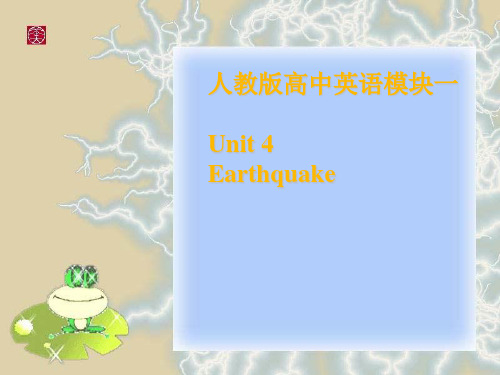
Tangshan, Hebei
July 28th, 1976
Unit 4
A NIGHT
THE EARTH DIDN’T SLEEP
Reading-I----fast reading (2m)
Fast reading
What does the passage mainly talk about?
Part 3: para 4
Sum up the main idea of each paragraph. (use oneReading-III----detailed reading (5m) word to describe it)
Para1
Para 2&3
Detail reading
signs
An earthquake happened in Tangshan in 1976
Reading-II----scanning (2m)
Sum up the main idea of each part of the passage.
(use one word to describe) Part 1: para 1 Part 2: para 2&3 signs damage recovery
How much do you know about an earthquake?
Many things will be destroyed. The supply of water and electricity… The water pipes will burst … …. People lost their homes…. Many people will die or be injured……
人教课标高一必修1 Unit 1
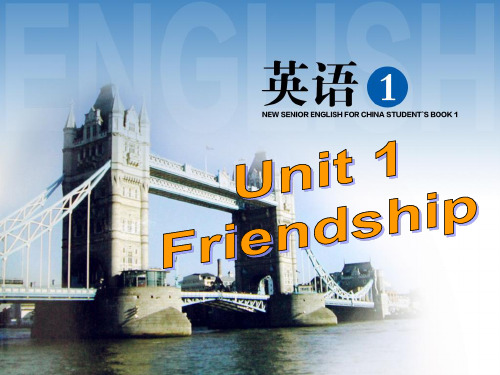
【探究】 recover “寻回; 取回”, 指无意或有意地 找到或得到曾经失掉的物质的或精神的东 西, 引申可指“恢复”、“重新控制”、 “重新获得”、“回复到正常状态”等。 用作及物动词时, 如以人作主语, 则用主动 结构; 如以物作主语, 则用被动结构。
1. add up 合计; 加起来 【教材原句】
1. upset adj. 心烦意乱的; 不安的; 不适的 vt. 使不安; 使心烦; 弄翻; 打翻; 打 乱; 扰乱(计划等)
【教材原句】
Your friend comes to school very upset. 你的朋友来上学时心情很不好。
【归纳】
be upset about/over/at sth. 为某事烦心 (sth.) upset sb. (某事)使人心烦意乱 (sb.) upset sth. (某人) 打翻/弄翻某物 It upsets sb. that... 使人心烦的是…… (it作形式主语) It upsets sb. to do sth. 做某事使某人心烦 (it作形式主语)
(sth.) up, get along with, fall in love, join in
课 laugh at, grow crazy about, keep / get sb. / 文 sth. done
1. There was a time when ... e.g. I can well remember there was a time when a deep blue sky, the song of the birds, moonlight and flowers could never have kept me spellbound. 2. It / This / That is / was the first / second / 句式 third / ... time (that) ... have / had done ... e.g. It was the first time in a year and a half that I’d seen the night face to face. 3. It’s no pleasure doing sth. e.g. It’s no pleasure looking through these any longer because nature is one thing that really must be experienced.
高中英语模块总复习新人教版必修1
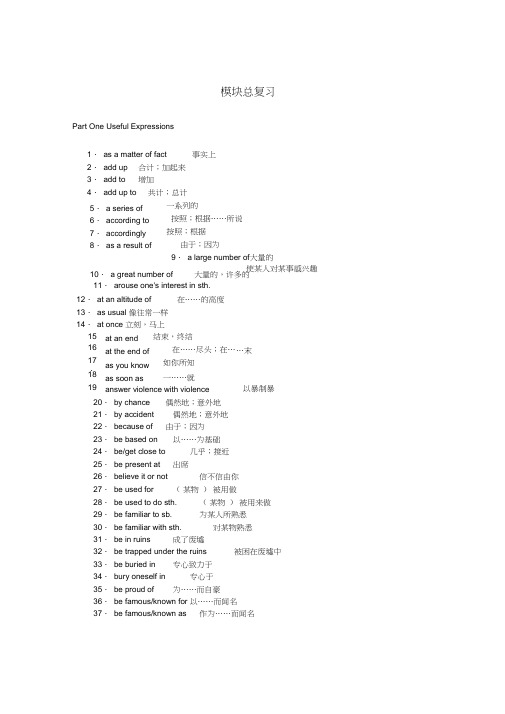
Part One Useful Expressions1. as a matter of fact事实上 2. add up合计;加起来 3. add to 增加4. add up to 共计;总计一系列的按照;根据……所说按照;根据由于;因为 9. a large number of 大量的11. arouse one's interest in sth.12. at an altitude of在……的高度 13. as usual 像往常一样14. at once 立刻,马上 15. at an end 结束,终结16.at the end of 在……尽头;在… …末 17. as you know 如你所知 18. as soon as 一……就 19. answer violence with violence 以暴制暴20. by chance 偶然地;意外地 21. by accident偶然地;意外地 22. because of由于;因为 23. be based on以……为基础 24. be/get close to几乎;接近 25. be present at出席 26. believe it or not信不信由你 27. be used for ( 某物 ) 被用做28. be used to do sth. ( 某物 ) 被用来做29. be familiar to sb. 为某人所熟悉30. be familiar with sth. 对某物熟悉31. be in ruins成了废墟 32. be trapped under the ruins 被困在废墟中 33. be buried in专心致力于 34. bury oneself in专心于 35. be proud of 为……而自豪36. be famous/known for 以……而闻名 37. be famous/known as作为……而闻名 模块总复习5. a series of 6. according to 7. accordingly 8. as a result of10. a great number of大量的,许多的 使某人对某事感兴趣break up打碎;驱散 break down 分解;中断 break in/into 闯入;打断break a record破纪录 break the law 犯法be willing to do sth. 乐意做某事 be in trouble 处于不幸中,陷入困境 believe in 信赖 为……担忧;着急 失业 被判处……徒刑 be concerned in 参与come up 走近;上来;提升 come up to 达到come up with 提到 come to power 当权;执政 communicate with sb.与某人交流care about 在乎;在意;关心 change one's mind改变主意 can hardly wait to do sth. 迫不及待做某事come out of从……出来 come into/to power上台;掌权 calm down 平静下来;镇静下来 dream about/of 梦见;梦想dig out die for 挖掘,发现 为 ...而死;渴望 even if/though 即使 encourage sb.to do sth. 鼓励某人做某事 面对面;直接交流 相爱;爱上 首先;一则 再者;另一方面 倒塌 fight against 同……作斗争 fight for 为……而斗争fight with 与……并肩作战 go through 经历;经受 go across 走过39. 40. 41. 42. 43. 44. 45. 46.47. 48. 49. 50.51. 52. 53. 54. 55. 56. 57. 58.59. 60. 61. 62. 63. 64. 65.66. 67. 68. 69. 70. 71. 72. 73. 74. 75. 76. 77. 78.79. 80.81.be concerned about 关心;挂念 be concerned with 有关 在狱中 be in prison beworried about be out of work blow up 爆炸 besentenced to face to face fall in love with forone thing foranother thing fall down掉下, forbid sb.to do sth. 禁止某人干某事go down 平静;下沉go after 追赶go into 进入go off 离开;爆炸get alo ng with 与 .... 相处;进展give in (to ) 让步;屈服give up 放弃;认输give out 分发;用光give off 放出;散发 have got to 不得不;必须 have fun 玩得开心 hide away 躲藏起来 in order (not ) to 为了( 不)in some ways 在某些方面in no time 立刻,马上in the end终于;最后 in hon our of 纪念,向 ...... 表示敬意in fact事实上 in reward作为回报 insist on/upon doing坚持做某事 instead of代替,而不是 join in参加( 竞赛,娱乐,游戏 ) judge from 由 ... 来判断keep the law 守法 keep sb.from doing sth.阻止某人做某事 lose heart失去信心 laugh at 嘲笑;取笑 make up one's mind 下决心 make camp 扎营 more or less 或多或少 make (good/full) use of make a list 列清单 make fun of sb. 捉弄某人 native language 母语 on purpose 故意地 playa joke/jokes on sb. play a trick/tricks on sb. prevent sb.(from) doing sth. play arole (in)在 play a part (in )扮演一个角色;参与 put away 储存 ..... 备用;吃(喝)掉 put/throw sb.in prison把某人投入监狱 put up 举起;搭建;张贴83. 84. 85. 86. 87. 88. 89. 90. 91.92.93.94.95.96. 97. 98. 99. 100. 101. 102. 103. 104. 105. 106. 107. 108. 109. 110.111.112.113.114.115. 116. 117. 118. 119. 120. 121. 122. 123. 124. 125. ( 充分 ) 利用开某人的玩笑 捉弄某人 阻止某人做某事 中担任角色;在……中起作用126. persuade sb.(not ) to do sth. 说服别人 (不 ) 要做某事Part Two Useful Structures1. n ot...u ntil... 直到 .. 才 ...I'm sorry.I can't go to see you until next Friday.很抱歉,我要到下周五才能去看你。
人教版高中英语必修一Book1_Unit3.docx
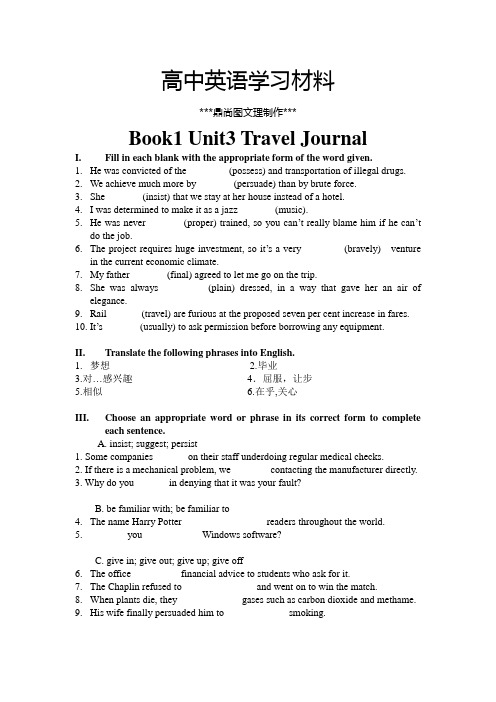
高中英语学习材料***鼎尚图文理制作***Book1 Unit3 Travel JournalI.Fill in each blank with the appropriate form of the word given.1.He was convicted of the ________(possess) and transportation of illegal drugs.2.We achieve much more by _______(persuade) than by brute force.3.She _______(insist) that we stay at her house instead of a hotel.4.I was determined to make it as a jazz _______(music).5.He was never _______(proper) trained, so you can’t really blame him if he can’tdo the job.6.The project requires huge investment, so it’s a very ________(bravely) venturein the current economic climate.7.My father _______(final) agreed to let me go on the trip.8.She was always _________(plain) dressed, in a way that gave her an air ofelegance.9.Rail ______ (travel) are furious at the proposed seven per cent increase in fares.10.It’s _______(usually) to ask permission before borrowing any equipment.II.Translate the following phrases into English.1.梦想____________2.毕业__________3.对…感兴趣_____________ 4.屈服,让步________5.相似__________6.在乎,关心______________III.Choose an appropriate word or phrase in its correct form to complete each sentence.A. insist; suggest; persist1. Some companies ______ on their staff underdoing regular medical checks.2. If there is a mechanical problem, we _______ contacting the manufacturer directly.3. Why do you ______ in denying that it was your fault?B. be familiar with; be familiar to4.The name Harry Potter ________________ readers throughout the world.5._______ you ___________ Windows software?C. give in; give out; give up; give off6.The office _________ financial advice to students who ask for it.7.The Chaplin refused to ______________ and went on to win the match.8.When plants die, they ____________ gases such as carbon dioxide and methame.9.His wife finally persuaded him to ____________ smoking.plete each sentence according to the Chinese given.1.他下定决心要赢得这场比赛。
人教版高中英语必修一Unit 1 Grammar .docx
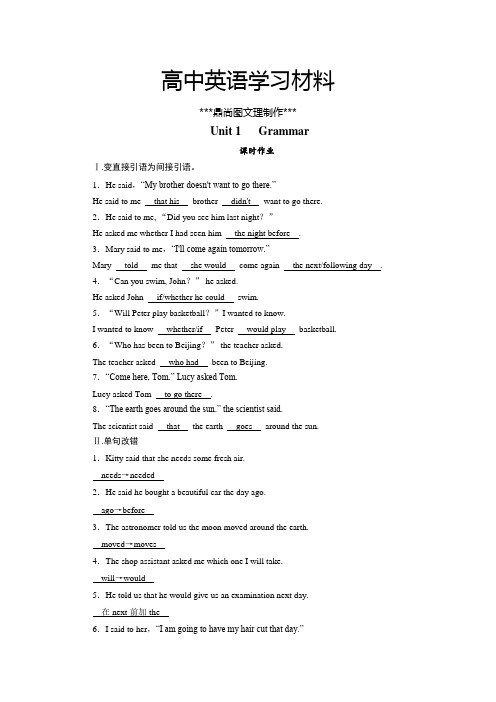
高中英语学习材料***鼎尚图文理制作***Unit 1 Grammar课时作业Ⅰ.变直接引语为间接引语。
1.He said,“My brother doesn't want to go there.”He said to me that his brother didn't want to go there.2.He said to me, “Did you see him last night?”He asked me whether I had seen him the night before .3.Mary said to me,“I'll come again tomorrow.”Mary told me that she would come again the next/following day . 4.“Can you swim, John?” he asked.He asked John if/whether he could swim.5.“Will Peter play basketball?”I wanted to know.I wanted to know whether/if Peter would play basketball. 6.“Who has been to Beijing?” the teacher asked.The teacher asked who had been to Beijing.7.“Come here, Tom.” Lucy asked Tom.Lucy asked Tom to go there .8.“The earth goes around the sun.” the scientist said.The scientist said that the earth goes around the sun.Ⅱ.单句改错1.Kitty said that she needs some fresh air.needs→needed2.He said he bought a beautiful car the day ago.ago→before3.The astronomer told us the moon moved around the earth.moved→moves4.The shop assistant asked me which one I will take.will→would5.He told us that he would give us an examination next day.在next前加the6.I said to her,“I am going to have my hair cut that day.”that day→todayⅢ.语法单句填空1.I asked him whether he would stay at home or go out for hiking.解析:直接引语如果是选择疑问句,变间接引语时选择疑问句变为由whether引导的宾语从句,而不用if引导宾语从句。
- 1、下载文档前请自行甄别文档内容的完整性,平台不提供额外的编辑、内容补充、找答案等附加服务。
- 2、"仅部分预览"的文档,不可在线预览部分如存在完整性等问题,可反馈申请退款(可完整预览的文档不适用该条件!)。
- 3、如文档侵犯您的权益,请联系客服反馈,我们会尽快为您处理(人工客服工作时间:9:00-18:30)。
高中英语学习材料***鼎尚图文理制作***人教版模块一Unit Four Earthquake课程标准中的内容标准:本单元的话题是“地震”,内容涉及“中国唐山地震的不眠之夜”、“美国旧金山1906年地震”、“地震后重建的新唐山”、“地震的基本知识”、“在地震或突遇的灾难中如何自救、救人”等。
本单元的语言知识和技能都是紧密围绕这一主题设计展开的。
教学细目:1、(情感目标)通过阅读,了解地震的起因、前兆、危害以及如何在地震中自救。
尤其是告诉学生地震是可怕的,但是人们应尽力减少由地震带来的损失,相信未来是光明的。
2、(交际)通过听说学习描述所见图片,并发挥想象描述地震后的情景,加强自己对地震的认识。
3、(词汇)通过阅读、师生互动掌握本单元的教学目的和要求中的词汇。
4、(写作)通过阅读和书面训练,学习并掌握通过标题和提纲写一篇英语文章。
5、(语法)通过书面训练,深入理解和进一步运用定语从句。
学习领域与主题内容及要求目标层次人教版必修一UnitFourEarthquakes理解掌握运用1.4.1. 话题:Earthquakes √1.4.2功能(通过听和说,能在生活中运用下列英语进行交际):1. Thanks and gratitudes (感谢和感激)I would like to express my thanksto..I wish to express my thanks for thegreat efforts…√I’d like to thank…No words are strong enough toexpress our…2. Giving an oral speech(作口头演讲)I’d like to thank those who…I remember…It seemed as if…Not long after that…Luckily…√1.4.3 Understanding vocabulary(理解词汇)(通过听、看、阅读,能理解下列词汇含义。
学生只需认识,不作为测试的内容考查。
)crack, smelly,farmyard, survivor,√1.4.4 Grasping vocabulary(掌握词汇)(通过听、看、读,能运用下列词汇进行造句,在完形填空和短文改错中运用下列词汇。
学生能够掌握其意义、用法、搭配,可作为考查内容。
)earthquake, quake, well, pipe, million,event, nation, canal, steam, dirt,suffering, extreme, brick, dam, track,useless, electricity, disaster, mine, miner,shelter, title, reporter, bar, damage,frighten, frightened, frightening, congratulation, judge, sincerely, express,outline, headline, cyclist1.4.5 Applied vocabulary(应用词汇)√(通过书面训练,能在书面表达中运用下列词汇。
)right away, burst, as if, at an end, ruin,in ruins, injure, destroy, shock, rescue,trap, dig out, bury, a (great) number of√√1.4.6语法:Lean the attributive 学习定语从句(通过阅读,书面训练,能在完成句子、短文填空中运用下列语法句型。
)Workers built shelters for survivorswhose homes had been destroyed.(whose在从句中作定语,指代人)The room whose windows facessouth is mine.(whose在从句中作定语,指代物)He has written a book whose name I’v eforgotten.=He has written a book the name ofwhich I’ve forgotten.=He has written a book of which thename I’ve forgotten.√√1.4.7句型结构:(通过口、笔头训练,能在完成句子、书面表达中运用下列句子结构.)1. Mice ran out of the field looking forplaces to hide.2. But the one million people of the city,who thought little of these events, wereasleep as usual that night.3. It seemed as if the world was at anend!4. All hope was not lost.5. The number of people who were killedor seriously injured reached more than400,000.Such a great number of people diedbecause the quake happened while theywere sleeping.6. It was a frightening night.This frightened boy whose mother waslost in the disaster is looking for her now.7. Your speech was heard by a group offive judges, all of whom agreed that itwas the best one this year.8. Our office would like to have youspeak to the park visitors on July 28 at11:oo am.Part One 单元重点知识点I. 重点单词和词组P. 25Words: imagine, earthquake, quake, shakePhrases: right awayP.26Words: well, pipe, burst, million, event, nation, canal, steam, injure, dirt, suffering, extreme, destroy, brick, dam, track, useless, shock, rescue, trap, electricity, disaster, bury, mine, shelterPhrases: as if, at an end, in ruins, dig outP.27Words: title, reporterPhrases: a (great) number ofP.28Words: bar, frighteningPhrases: of no useP.30Words: invitation, congratulation, judge, sincerely, expressPhrases: be proud of, express one’s thanksP.31Words: outline, headline, cyclistII. 重点句型见表1.4.7III. 重点语法定语从句关系代词whose的用法:whose 在从句中作定语,修饰其后的名词,whose 指代先行词的既可以是人,也可以是物。
有些情况下,“whose+n”.也可以转换为“of which /whose+the +n.”。
Part Two 单元目标检测I. 根据下列句子意思用所给词的正确形式或所给汉语填空(1X20=20’)1. You should make a(n) ________(提纲) before you write a composition.2. Please give him my ____________(祝贺)when you see him.3. When water is heated to 100℃,________(水汽) comes out from it.4. Back from the cinema,the couple were ________(震惊) on seeing their house broken into.5. A good __________(骑自行车的人) can cover a distance of over a hundred miles a day.6. It is a great h__________ for me to be able to attend this gathering7. Learning to ___________( oneself well is an important part of communication8. ________ (砖)are still a main kind of building material now.9. The newspaper sent some ________(report) to cover the event immediately it happened.10. Now in some countries thousands of people are living in __________(极度的)poverty.11. The soldiers ________ (trap)their enemies and forced them to give in.12. The old couple were at last ___________(营救) by the local people.13. Don’t eat that food. It is already ________( smell).14. He received an __________(请柬)to dinner yesterday.15. ___________(bury)in her essay, she didn’t notice me standing by her.16. The soldiers built many __________(避难所) for those who lost their homes.17. Both the drivers were ___________(受伤) in the accident.18.A man should be _________ (judge) by his deeds, not by his appearance19. Please accept my ___________(真诚的) thanks and best wishes.20.So many _________(灾难) happened to them1. His car was buried by the snow and had to be ________(dig).2. They _______________(think)my suggestion,which made me a little upset.3. Please wait for a moment. I’ll find the address for you __________(away).4. Quite ____________(number) world-famous paintings are on show in this exhibition.5. The children were happy that the long hot summer was at last _______(end).6. We ___________(proud) our son for not giving in to such difficulties.7. We couldn’t continue our way for we had __________ (run) petrol.8. The earthquake left the whole town ________(ruin).What a terrible sight!9. You must watch your step so as not to __________(fall).10. She was shaking with terror ________ (as) she’d seen something terrible.III.语法填空。
